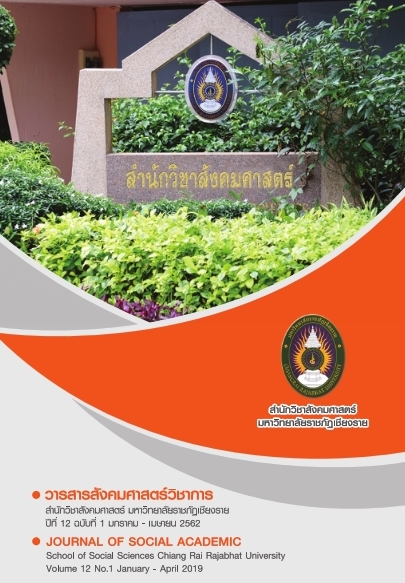การยอมรับและใช้งานสมาร์ตกริดเทคโนโลยีของผู้บริโภค
Main Article Content
บทคัดย่อ
สมาร์ตกริดเป็นหนึ่งในเทคโนโลยีที่มีความก้าวหน้าของโลกในยุคปัจจุบันทางการบริหารจัดการพลังงานไฟฟ้าเพื่อเพิ่มประสิทธิภาพ เป็นการรวมเอานวัตกรรมทั้งเทคโนโลยีสารสนเทศและการสื่อสาร และระบบสายส่งเข้าด้วยกัน ทำให้เกิดการแลกเปลี่ยนข้อมูลสารสนเทศแบบทันที (Real Time) การยอมรับของผู้บริโภคที่มีต่อเทคโนโลยีนี้เป็นสิ่งสำคัญต่อความสำเร็จในการนำเสนอต่อสาธารณะ อย่างไรก็ตามการศึกษาที่หลากหลายได้มีการสำรวจการยอมรับเทคโนโลยี และความเข้าใจที่มีต่อสมาร์ต กริดของผู้บริโภค โดยใช้ทฤษฎีและแบบจำลองที่หลากหลายที่ได้มาจากบทความที่เกี่ยวข้องกับการยอมรับใช้เทคโนโลยีมาอธิบาย โดยใช้แบบจำลองที่มีชื่อเสียงที่นำมาใช้ในงานวิจัยครั้งนี้คือ แบบจำลองการยอมรับใช้เทคโนโลยี (Technology Acceptance Model: TAM)ร่วมกับทฤษฎีที่เกี่ยวข้องกับการยอมรับเทคโนโลยีเช่น ทฤษฎีการแพร่กระจายนวัตกรรม (DOI) แบบจำลองทฤษฎีแรงจูงใจ (MM)ทฤษฎีปัญญาทางสังคม (SCT) และแนวคิดเกี่ยวกับสมาร์ตกริดเทคโนโลยี เป้าหมายของการศึกษาครั้งนี้เป็นการนำเสนอแบบจำลองผสมที่ได้มาจากทฤษฎีและแบบจำลองข้างต้น โดยมีการกำหนดตัวแปรที่ส่งผลต่อการยอมรับและส่งผลกระทบต่อ ค่าความแปรปรวนของการยอมรับสมาร์ตกริดเทคโนโลยีของผู้บริโภค โดยประเด็นเหล่านี้ส่งผลต่อการตัดสินใจของผู้ใช้งานใน การใช้นวัตกรรมของเทคโนโลยี ผลของการศึกษาครั้งนี้สามารถนำไปเป็นข้อมูลสำหรับผู้ออกกฎระเบียบ ผู้ออกนโยบาย และนักการออกแบบและพัฒนาระบบเช่น ผู้ให้บริการด้านสมาร์ตกริด ผู้ผลิตสมาร์ตมิเตอร์ และผู้ผลิตอุปกรณ์เครื่องใช้ที่สนับสนุนระบบสมาร์ตกริด โดยเป็นการพัฒนาที่มาจากมุมมองและความต้องการของผู้ใช้งาน
Article Details
รายละเอียดของลิขสิทธ์
เอกสารอ้างอิง
สำนักงานนโยบายและแผนพลังงาน. Information Technology Journal. (2558). แผนพัฒนากำลังผลิตไฟฟ้าของประเทศไทย พ.ศ2558-2579 (PDP2015). กระทรวงพลังงาน.
สิงหะ ฉวีสุข และ สุนันทา วงศ์จตุรภัทร. (2555). ทฤษฎีการยอมรับใช้เทคโนโลยีสารสนเทศ. KMIT
Bandure. (1986). Social Foundations of Thought and Action: A Social Cognitive Theory. Prentice Hall.Englewood Cliffs, NJ.
Accenture.(2010). Understanding Consumer Preferences in Energy Efficiency.Accenture, Dublin.
Ahmad RozelanYunus, Fairus Abu, JuhainiJabar, 2Arfah Ahmad. (2015). Empowering Smart Customer to Participate in Electricity Supply System. Australian Journal of Basic and Applied Sciences.9(4) Special 2015, 110-114.
Chan Kook Park, Hyun Jae Kim, Yang Soo Kim. (2012). An empirical study of the smart grid technology acceptance model in Korea. 2sd IEEE ENERGYCON Conference & Exhibition, 2012.ICT for Energy Symposium.
Chan-Kook Park, Hyun-Jae Kim, Yang-Soo Kim.(2014). A study of factors enhancing smart grid consumer engagement.Energy Policy.
Clement and Kevin.(2016).The Smart Grid vs. The Current Grid. Retrieved 18 March 2016.สืบค้นเมื่อวันที่ 5 กรกฎาคม 2559. จาก https://smartgridtech.wordpress.com/smart-grid/.
Davis, F. (1985).A technology acceptance model for empirically testing new end-user information systems: theory and result. Unpublished Doctoral dissertation, MIT Sloan School of Management.
Davis, F., Bagozzi, R., &Warshaw, P. (1989).User Acceptance of Computer Technology: a Comparison of Two Theoretical Models. Management Science.
EcoAlign, (2010).Separating Smart Grid from Smart Meters? Consumer Perceptions and Expectations of Smart Grid.EcoAlign, Boston.
GE.(2010). Smart Grid Survey: Majority Down Under still wonder. GE, New York.
IBM.(2011). Knowledge is power. White Paper. IBM, New York.
Jacky Chin, Shu-Chiang Lin. (2015).Investigating Users’ Perspectives in Building Energy Management System with an extension of Technology Acceptance Model: A Case Study in Indonesian Manufacturing Companies. Procedia Computer Science 72.
Janis Kossahl, JohnnKranz, Lutz M. Kolbe. (2012). A Perception-base Model for Smart Grid Adoption of Distribution System Operators – An Empirical Analysis. Proceedings of the Eighteenth Americans Conference on Information System.
Jennie C. Stephens, Elizabeth J.mWilson, TarlaRai Peterson. (2015). SMART GRID (R)EVOLUTION Electric Power Struggles.Cambridge University Press. New york, NY 10013-2473, USA.Jui-Sheng Chou, Changwan Kim, Thanh-KhietUng, I GustiAyu Novi Yutami, Guo-Tai Lin, Hyojoo
Kim, H.J., Park, J.H., Park, C.H..(2012). A study on key influencing factors in smart gridconsumer engagement. Informatiz.Policy 19 (1).
Layla AlAbdulkarim, ZofiaLukszo, Theo Fens. (2012). Acceptance of Privacy-Sensitive Technologies: Smart Metering Case in The Netherlands. Third International Engineering Systems SymposiumCESUN 2012, Delft University of Technology.
Pike Research.(2010). Smart Grid Consumer Survey. Pike Research, Boulder.
SGCC (Smart Grid Consumer Collaborative).(2010). Consumer Voice: Results of Baseline Focus Groups. SGCC, Atlanta
Son. (2015). Cross-country review of smart grid adoption in residential buildings. Renewable and Sustainable Energy. 48.
Wu, J.H., Wang, S.C..(2005). What drives mobile commerce? An empirical evaluation of the revised technology acceptance model. Inf. Manag. 42.
Zpryme.(2011). The New Energy Consumer. Zpryme, Mountain City.


